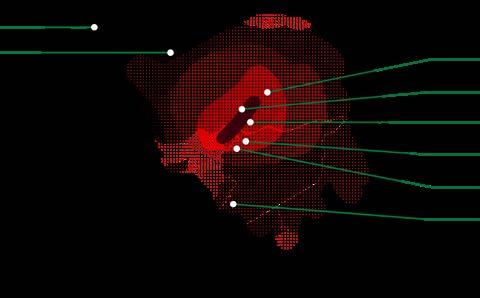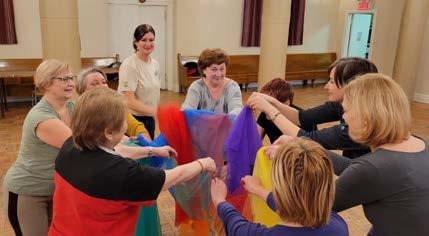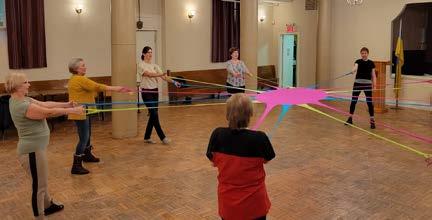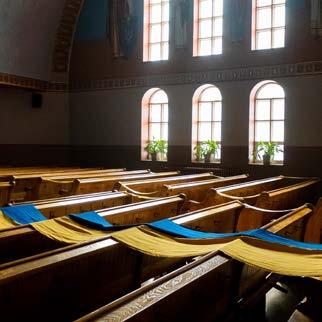
7 minute read
CONCORDIA STUDENTS IMPACTED BY TURKEY-SYRIA EARTHQUAKE CONCORDIA SCHOLAR HELPS UKRAINIANS HEAL THROUGH DANCE

As Ukraine enters the second year of war, Tetiana Lazuk uses dance-movement therapy to help refugees
Advertisement
BY MARIEKE GLORIEUX-STRYCKMAN // NEWS EDITOR
One year after the beginning of the war, Ukrainian refugees in Montreal are working to heal from their difficult experiences and get settled in their new life.
In the heart of the Mile End, the Ukrainian National Federation of Canada (UNF) offers wellness activities to help refugees find community through dance-movement therapy.

Tetiana Lazuk is a Ukrainian dance therapist and a scholar-in-residence at Concordia, and she leads dance-movement sessions at the UNF.
During these classes (which are taught in Ukrainian), she helps refugees heal from their difficult experiences in the war through dance.
“It’s not only this psychological support, wellness,” she said, “but it’s also helping to connect people who have a lot in common, and helping them to find their place and to establish here in Canada.”
While the war has faded from public attention in the past few months, it is still very real for Ukrainians in Montreal and throughout the world.
“On Feb. 24, 2022, many people thought that Ukraine would cave within a few days, if not a few weeks,” said Michael Shwec, president of the Quebec Provincial Council of Ukrainian Canadian Congress. “We’re coming up to a year, right now, where the Ukrainian people are very resolute in their defense of their territory, their culture, their language.”
The Ukrainian Canadian Congress represents 1.4 million Ukrainians around Canada, according to their website. While they have supported the Ukrainian community from their beginnings, work has increased considerably in the last year.

“We need to help [displaced Ukrainians] land and be successful in Canada, for those who wish to stay,” said Shwec. “That means everything from housing to education, to employment, to have some sense of normalcy in their lives, and help them bridge that gap from Ukraine to here, as best as possible.”
This is exactly what Lazuck strives to do. She lived in Ukraine until 2009, when she moved to Canada to continue her studies in dance-movement therapy. She started working with Ukrainian refugees at the UNF in September.
Lazuk pointed out that her experience moving to Canada was very different from many refugees. She was prepared for her new life, for the changes it would bring, and for the challenges she would need to overcome. The refugees she works with did not get that preparation.
“These people were forced to leave their country, and many of them had excellent, great professions, perfect life conditions, and now they are forced to move to another country,” said Lazuk.
“Many of them don’t speak English or French, so they need to learn, they need to adapt.”
The UNF’s aim is to provide refugees with the resources to do just that. The organization helps Ukrainians find a community and adjust to their new life in Canada. nians coming into the country. In March 2022, the government created a new emergency travel visa for Ukrainians. However, the war is not over, said Shwec. “As long as genocide continues in Ukraine, which it does, there’s never enough done. Enough will be when Russian forces are out of Ukraine and the genocide stops,” he said.
According to Lazuk, specialized psychotherapy is important to help them process their experiences in the war. On the flip side, her dance-movement sessions help Ukrainians connect with their community and handle the hardships of leaving their homeland.
“They meet all together, they discuss what problems they’re facing, and how to get through this,” she said.
“Before our lives, livestreamed, is a genocide happening in what has been a very peaceful European country. The onus is on every single student to reflect on what is actually happening, and to make sure that you take a stand, and you defend the values that you believe in.”
The last time Lazuk visited her home land was in November 2021, to see her and her husband’s families — a few months before the beginning of the war. She looks forward to the next time she can visit her country, hopefully soon.
“We all hope that finally, peace comes to Ukraine, and we will be able to visit our family and help in rebuilding our country,” she said.
“Here in Canada, life continues. We have plans, we continue working. Dancing.” where to call home. If I decide to go now, where would I go?”
While some students report professors being insensitive to their experiences, others feel supported. Inceer said, “All of [my teachers] separately asked if I needed anything from them personally.”
Karam Helou is the internal vice-president of the Syrian Student Association at Concordia (SSA). “[One professor from JMSB] reached out to me on the day of the earthquake. She made sure that my family was okay. I thought that was really sweet of her,” he said. On Feb. 7, the International Students Office (ISO) at Concordia sent an email to members of the Syrian and Turkish community offering support. “We are devastated to hear of the earthquakes in Syria and Turkey this week. I would like to personally let you know that we are thinking of you and your families,” wrote Kelly Collins, manager of the ISO. The email contained links to various University resources. From international students to Quebec residents, a number of University members received the email, including Inceer. Göçmez, Helou, and Dadouche are among students who reported not receiving the ISO’s message.
Dadouche feels that the University was very outspoken when the Russian invasion of Ukraine began. “[It] was like, ‘the news that is happening in Ukraine is a lot on all of us, so take all the time you need and these are the mental resources that you may need.’”
Dadouche does not feel the same message was put out by Concordia after the earthquake.
“I just keep thinking, are we not human? Do we not matter?”
When the war in Ukraine officially began on Feb. 24, 2022, the University published a notice online with resources for those who may be impacted four days later. On March 3, 2022, Concordia President Graham Carr came out with a statement on the war.
After the Feb. 6 TurkeySyria earthquake, Concordia published a notice online with links to resources seven days later.
“The notice for students was posted on the Student Hub [on Feb. 13] when we realized this was not done [on Feb. 10] which was an oversight on our part,” said Concordia spokesperson Vannina Mestracci.
“I don’t think we’re waiting for any sort of statements from [President Carr]... we’ve [gotten] used to it,” said a Syrian student studying at JMSB. “We got used to being left out,” they added.
“Hearing the voice of the administration a little bit louder would be helpful. Helpful to whom? Helpful to us, to the people here [in Montreal]. But hearing that, [will it] do anything to the people who simply perished under concrete over there?” said the anonymous professor mentioned earlier.
“From a PR point of view, this is important. I wish there was a louder and more compassionate voice from the administration.”
Tuana Bıçakcı is a Turkish student who has been a part of fundraising efforts on campus.
“The lack of acknowledgement and support from the University is a little sad…It is really heartbreaking and scary to be so far away from your loved ones when a tragedy like this happens… we could have been so grateful if the University supported us a little more.”
Hindered by international sanctions, getting aid to Syria has been tough. “[Syrians are] human just as much as the Turkish people, just as much as the Ukrainian people,” said Dadouche. “I think the bare minimum [that] the dean or the president or any professor can do is just raise awareness for a couple of minutes. For example, at the beginning of the class.”
Inceer has felt differently “I actually didn’t pay attention to [the University’s acknowledge- ment]… I had other worries.”
She has been preoccupied with her family feeling secure again.
“I’m just trying to find work and help my family...They left everything they own…it keeps me up [at night] and I just want to be able to help them and send money to them. That’s my main focus right now.”
Göçmez also has finances on his mind. “Concordia could open up bursaries for people who are impacted by these events…My family lost their house. My father’s business has stopped there. I will be having financial hardships,” expressed Göçmez.
Combating feelings of helplessness, Göçmez and Inceer volunteered at the Turkish Student Association’s (TSA) donation site. The site was on the seventh floor of the Hall Building from Feb. 7-10. While the TSA is no longer taking material donations, they are still taking monetary donations.
“I focus on what I can control and I feel like this is something I have to do,” said Mert Kaan Kaseler, co-president of the TSA. From sanitary pads to flashlights, the collected materials were swiftly flown to Turkey.
Tolga Osmancik is a Turkish student heavily involved with the fundraising efforts.
“This can happen to anyone in any country. When something like this happens, we should remember that we are human beings,” he said.
On Feb. 13, the SSA had an event in the Hall Building as well. In order to support the SSA, you can follow them online.
Jana Noufal Al-Atassi is the SSA’s vice-president of finance. “It would be great if more people talked about what’s happening and what’s been happening even before the earthquake.” She discussed how the world let politics block humanitarian hurdles. “You have to keep in mind [that Syrians are] not numbers. These are humans that are dying.”
“There’s one difference between what’s happening in Turkey and Syria… the sanctions placed on Syria,” said Helou. “If certain powers wanted to send aid to Syria, they could have,” said Talal Akkad, a Syrian student. Inceer discussed how Turkey could have been better prepared. “It’s a big earthquake. Three of them happened on the same day… another one happened two weeks after… [but] this shouldn’t have been the result,” she said. When growing up, Inceer would hear discussions about her area (atop the East Anatolian Fault) being overdue for an earthquake. She is perplexed at how Turkey was unprepared. “You think [the overdue earthquake] is a myth because you trust that the system knows better… when it actually happens, you feel so helpless because it’s the system… you by yourself can’t change the system.”
Since last year, the Canadian government has implemented many measures to help Ukrai-









